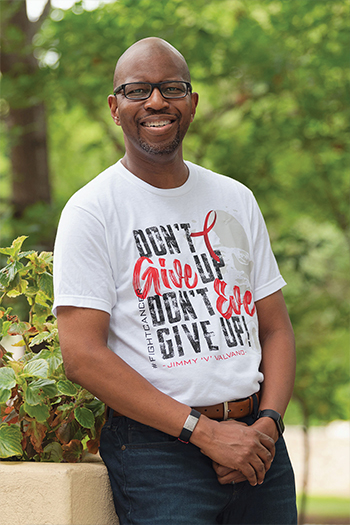Multiple Myeloma Survivor
Survivor leans on project management skills during treatment

Gregory Proctor overcame a high-risk multiple myeloma diagnosis at age 50 with strength, determination and courage. Having never heard of multiple myeloma, he and his wife Monica dedicated themselves to learning about it and making his treatment their group project. Today, he is in remission and passionate about educating others.
One morning I woke up with excruciating pain in my lower right back. I could barely move. My general physician did X-rays, blood work and gave me an anti-inflammatory shot for pain. The medication did nothing. I sought out a spine management specialist who ordered an MRI. Results showed a tumor across the sciatic nerve area. After another MRI with contrast, the doctor looked at my wife and me very seriously and said, “You need to see an oncologist now.”
We were in shock, but one of the things that my wife and I processed during that time was the fact that whatever it was, we wanted to deal with it head-on. We felt we could overcome it.
Fortunately, the oncologist we found could get us in right away, and I went through multiple tests and an excruciating bone marrow biopsy. They had trouble getting through my bones to get a sample but were successful after the third attempt. Luckily, they got enough of a sample that they could do cytogenetic tests. About 48 hours later, we went back to get the results.
I was diagnosed with multiple myeloma and at the time my knowledge of the disease was very, very low. My wife and I stared at the oncologist. We had no clue what the next steps would entail. She explained that my multiple myeloma was high risk, and that I needed to start treatment right away. In fact, I started chemotherapy the following week.
As a project manager for most of my life, I knew I needed to teach my wife the skills I use on the job so that we could be a team. She had a background in logistics, so it was not too hard. She created trend charts and analyzed my lab results, while I focused on treatment and organizing insurance details.
Treatment was tough – five days a week for two and a half months, but then we started to see the results we needed. The next step was an autologous stem cell transplant (SCT).
After the transplant, the only thing I wanted to do was sleep. My doctors called to check on me, and they advised that one of the best things for helping my cells reproduce was exercise. My wife and I laid out a strategy to start walking. At the 100-day mark after my SCT, I was walking 150 miles a month. Good nutrition and exercise were instrumental aspects of my expedient recovery. Today, I am considered in remission.
I want to also share that the financial aspect of cancer is a reality that doesn’t get enough attention. Managing your insurance plan and working with the hospital is a critical component to ensuring you get the treatment needed. Meet with your cancer center's or hospital’s financial counselors if they have them and be sure you, and they, understand your insurance coverage. I experienced issues with my insurance company delaying payments, and it complicated my treatment plan. It was extra stress at a time when we didn’t need any additional concerns.
Originally, I was not looking to share my story. I only wanted an outlet for my mental health, so I wrote every day. But then I decided if I could help one person going through what I went through, it would be a blessing.
I shared my story on my worldwide podcast, Kut2thaChase, and across multiple social media channels where I was approached by the Leukemia & Lymphoma Society (LLS). After I was given a co-pay grant from them, they began following me in some Facebook groups. They originally invited me to be a featured guest on their Bloodline Podcast and then to speak at some of their webinar events. I was named the 2023 Adult Honored Hero as part of the LLS Visionary of the Year Campaign and became part of the executive leadership team for the LLS Light the Night event. I’m also a patient advocate for HealthTree Foundation, a non-profit organization that educates patients. And, I’ve written a book about my experience, Faith, Strength & Courage. It is now available on Amazon. I hope it inspires others on their journey.
My advice to those newly diagnosed:
- You are not alone.
- Accept that you will be on this journey for the long haul. But don’t let having multiple myeloma consume your life.
- Surround yourself with positive people who lift you up.
- Don’t ever give up!


